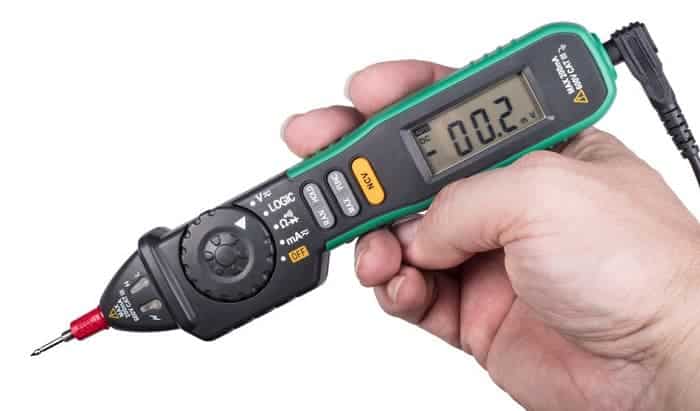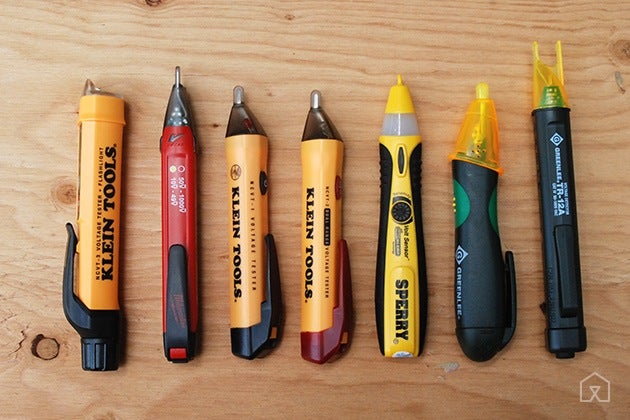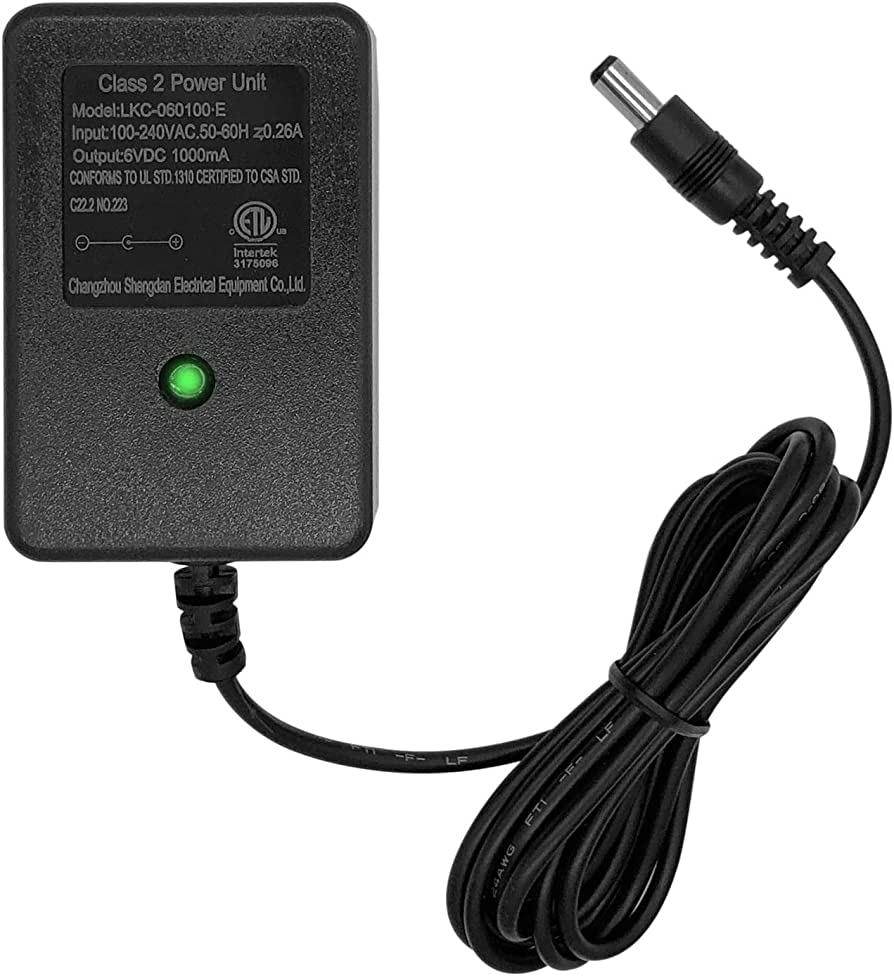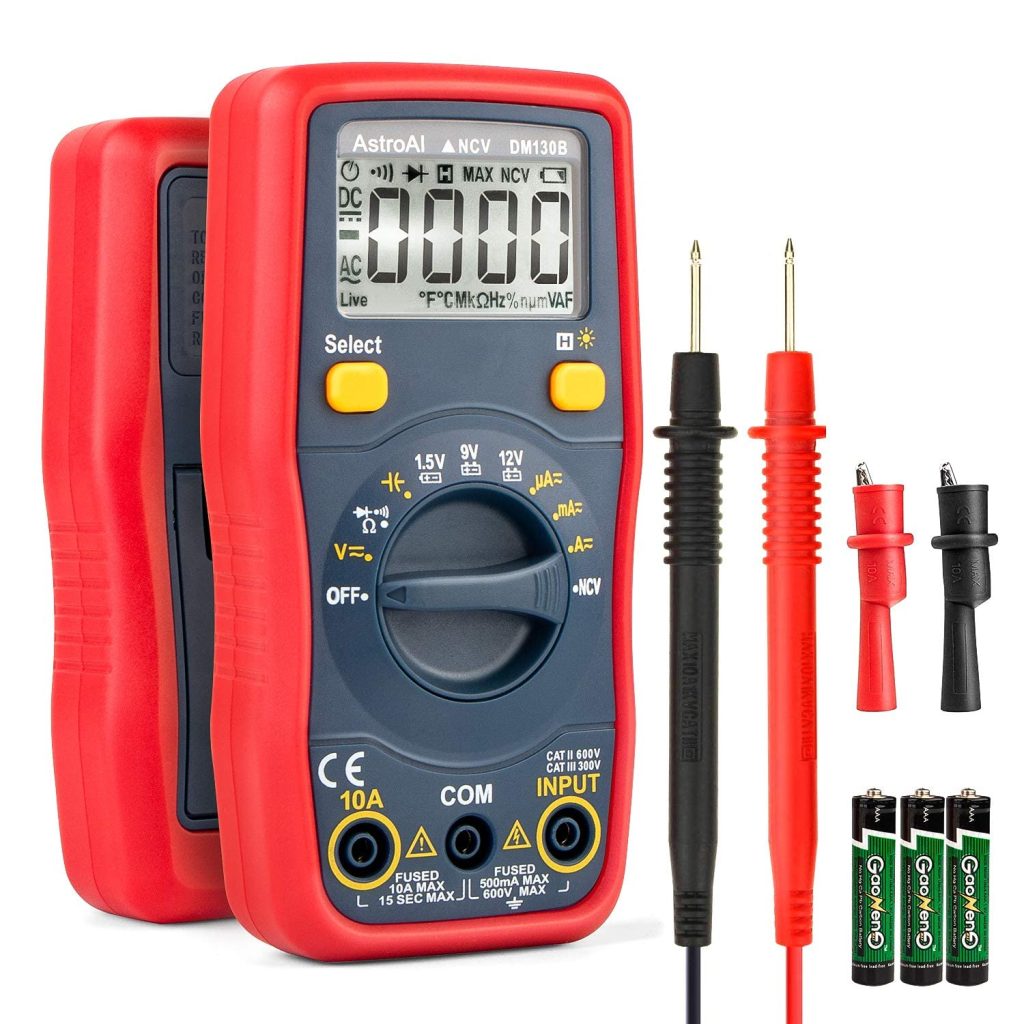The best non contact voltage tester is the Klein Tools NCVT-1. This tester is designed to safely and accurately detect AC voltage in electrical wiring and outlets. It has a bright LED that illuminates when voltage is detected, and it also has an audible beep to alert the user.
The NCVT-1 is easy to use and provides reliable results.
A non-contact voltage tester is a handy tool that can be used to check for the presence of AC voltage without having to physically touch the wire or circuit being tested. This type of tester uses a small, handheld probe that is placed near the area being tested. If there is voltage present, the tester will emit a loud beeping sound and/or display a reading on its digital display.
Non-contact voltage testers are safe to use on live wires and circuits, and can be used to test for voltage in hard-to-reach places. They are an essential tool for electricians, HVAC technicians, and anyone else who works with electrical systems. If you’re looking for a non-contact voltage tester, we’ve got some great options for you to choose from.
Our top pick is the Klein Tools NCVT-3 Non-Contact Voltage Tester , which offers reliable testing in a compact and easy-to-use package. For something a little more budget-friendly, try the Southwire Volt Alert Non-Contact Voltage Tester . And if you need a tester that’s specifically designed for checking AC outlets, take a look at the Fluke 1AC II VoltAlert AC Non-Contact Voltage Tester .
Top 6 Best Non Contact Voltage Testers Review in 2023 – Which One Should You Buy?
Are Non Contact Voltage Testers Reliable?
Are non contact voltage testers reliable?
The answer is a resounding “yes”! These handy little devices are designed to help you quickly and easily identify whether or not there is an electrical current running through a wire, without having to physically touch it.
So, how do they work? Non contact voltage testers work by using something called the “electrical principle of induction”. Basically, this means that when there is an electrical current running through a conductor (like a wire), it creates a magnetic field around it.
The tester has a sensor in it that can detect this magnetic field, and from that, determine whether or not there is current flowing through the conductor.
One thing to keep in mind with these testers is that they only work on AC currents (alternating current), so they won’t be any use for testing DC circuits (direct current). Additionally, they are only designed for low voltages – anything above about 50V may damage the sensor in the tester.
But as long as you keep these things in mind, non contact voltage testers can be a very useful tool for electricians and DIYers alike!
What Voltage Tester Do Electricians Use? Know about Best Non Contact Voltage Tester
Most electricians use a multimeter to test voltage. Here is the point of using Best Non Contact Voltage Tester. A multimeter is an electrical testing device that measures multiple electrical properties, including voltage, current, and resistance. When testing voltage with a multimeter, the electrician will first set the meter to the “voltage” setting.
They will then touch the black lead (known as the common lead) to one of the wires or terminals being tested, and the red lead to the other wire or terminal. The meter will then display a reading in volts. It’s important to note that when using a digital multimeter, you’ll need to ensure that the leads are touching the correct terminals on the meter – if they’re reversed, you’ll get an incorrect reading.
Additionally, most digital multimeters have what’s known as a “hold” function, which allows you to take a reading and then hold it on the screen so that you can write it down – this can be very helpful when taking multiple readings.
What is the Disadvantage of Volt Stick?
There are a few disadvantages to volt sticks. First, they can be inaccurate. If the stick is not inserted properly, it can give a false reading.
Second, volt sticks can be difficult to interpret. The readings can be affected by factors such as humidity and temperature, so it’s hard to know what the numbers mean without some experience. Third, volt sticks require regular calibration, which can be a hassle.
Finally, they’re not always available when you need them – if the power goes out, you won’t be able to use a volt stick to check the voltage!
What is the Best Tool for Checking Live Wires?
There are two types of tools for checking live wires: analog and digital. Analog tools measure the voltage on a wire by using a needle that deflects according to the amount of voltage present. Digital tools measure the voltage on a wire by using an LCD display that shows the numerical value of the voltage present.
Both types of tools have their pros and cons, but digital tools are generally more accurate and easier to use.

Credit: www.galvinpower.org
Best Voltage Tester for Home Use
Are you in the market for a new voltage tester? If so, you may be wondering what the best voltage tester for home use is. With so many different options on the market, it can be tough to know which one is right for you.
Here, we’ll take a look at some of the best voltage testers on the market, so you can make an informed decision about which one is right for your needs.
First up is the Klein Tools NCVT-3 Non-Contact Voltage Tester. This tester is designed for both home and commercial use, and it features a large LED display that makes it easy to see whether or not there is voltage present.
It also has a built-in flashlight, so you can easily test in dark areas. The NCVT-3 has a durable construction that will stand up to repeated use, and it comes with a two-year warranty.
Next on our list is the Fluke 1AC II VoltAlert AC Non-Contact Voltage Tester.
This tester is designed for both industrial and residential use, and it features a bright LED that makes it easy to see if there is voltage present. It also has an audible alarm that will sound if there is voltage present, so you can stay safe while working around electricity. The Fluke 1AC II comes with a two-year warranty.
Finally, we have the Milwaukee 2202-20 Volt Alert AC Non-Contact Voltage Tester. This tester is designed specifically for residential use, and it features an easy-to-read LED display that shows whether or not there is voltage present. It also has an audible alarm that sounds when there is voltage present, so you can stay safe while working around electricity.
The Milwaukee 2202-20 comes with a three-year warranty.
Fluke Non Contact Voltage Tester is one of the Best Non Contact Voltage Tester
When it comes to electrical testing, the Fluke Non Contact Voltage Tester is one of the most popular and versatile tools on the market. This tester is able to quickly and easily identify voltage in cables, cords, circuit breakers, lighting fixtures, switches, outlets and more without having to make any direct contact with the object being tested.
The Fluke Non Contact Voltage Tester is a great tool for both professionals and DIYers alike.
It’s simple to use – just hold the tip of the tester near an object or wire that you think may be energized and if there is voltage present, the tester will beep and the LED will light up. The tester also features a built-in flashlight so you can test in dark or hard-to-see areas.
If you’re looking for a reliable and easy-to-use non contact voltage tester, then look no further than the Fluke Non Contact Voltage Tester.
Best Electrical Tester Brand
There are many different brands of electrical testers on the market, but which one is the best? I am telling you about the Best Non Contact Voltage Tester. That’s a difficult question to answer because it depends on what you need the tester for. If you just need a basic tester for occasional use, then any brand will do.
But if you need a tester that is durable and can handle heavy-duty use, then you need to find a brand that specializes in electrical testing equipment. Some of the top brands of electrical testers include Fluke, Amprobe, and Klein Tools. These companies have been in business for many years and have earned a reputation for producing high-quality products.
They offer a wide variety oftesters, so you’re sure to find one that meets your needs. When choosing an electrical tester, be sure to consider what features are most important to you. Some testers come with built-in multimeters, while others have separate meters that must be purchased separately.
Some testers can test AC and DC voltage, while others can only test one or the other. And some testers come with features like data logging or temperature measurement capabilities. Choose the features that are most important to you and compare prices between different brands before making your final decision.
Fluke Voltage Tester is also Best Non Contact Voltage Tester
If you’re in the market for a voltage tester, the Fluke Voltage Tester is a great option to consider. This handy little tool can test AC and DC voltages up to 600 volts, making it perfect for home or office use. Here’s a closer look at some of the features that make the Fluke Voltage Tester a great choice:
– Easy to use. The Fluke Voltage Tester is very easy to use, even for those who are not familiar with electrical testing tools. Simply connect the leads to the voltage source and press the test button.
The digital display will show the voltage reading within seconds.
– Accurate readings. You can trust that the readings displayed on the Fluke Voltage Tester are accurate, thanks to its precision sensors.
– Durable construction. This tester is built to last, with rugged construction that can withstand heavy use.
– Safe operation.
The Fluke Voltage Tester is designed for safe operation, with an integrated circuit breaker that protects against accidental overloads.
Best Non Contact Voltage Tester Pen
Are you looking for a reliable and easy-to-use non contact voltage tester pen? It is essential for choosing Best Non Contact Voltage Tester. If so, you’ve come to the right place! In this blog post, we’ll take a look at the best non contact voltage tester pens on the market, and provide detailed information about each one.
First up is the Klein Tools NCVT-1 Non Contact Voltage Tester Pen. This pen is designed for testing AC voltages from 50-1000V, and features a large LED display that makes it easy to read the results. It also has a built-in flashlight for testing in dark areas, and an auto shut-off feature that conserves battery life.
Next is the Fluke 1AC II VoltAlert Non Contact Voltage Tester Pen. This pen can test AC voltages from 12-1000V, and features a bright LED that flashes when it detects voltage. It also has a built-in laser pointer for pinpointing the location of voltage sources, and an auto power off feature to conserve battery life.
Last but not least is the Extech VP600 Non Contact Voltage Tester Pen. This pen can test AC voltages from 50-600V, and features an LED light that illuminates when voltage is present. It also has a built-in sound alarm that alerts you to the presence of voltage, and an auto power off feature to conserve battery life.
Non Contact Voltage Tester Amazon
If you’re in the market for a non-contact voltage tester, Amazon has a great selection to choose from. The best non contact voltage tester is a handy tool that allows you to safely test for the presence of AC voltage without coming into contact with the live wire. This is especially useful when working with electrical circuits, as it can help prevent accidental shocks.
When shopping for a non-contact voltage tester on Amazon, there are a few things to keep in mind.
First, consider the features that are important to you. Some testers have simple LED indicators that show whether or not voltage is present, while others have more advanced features like LCD displays and built-in flashlights.
Second, think about the size and shape of the device – some models are designed to fit easily into your pocket, while others are larger and more bulky. Finally, take a look at the price – there’s a wide range of prices available, so be sure to find one that fits your budget. Once you’ve considered all of these factors, take a look at some of the top-rated non-contact voltage testers on Amazon and make your choice to buy Best Non Contact Voltage Tester!
Best Voltage Tester Reddit
If you’re in the market for a voltage tester, you may be wondering what the best option is. Luckily, Reddit has a great community of users who are happy to share their opinion on the matter and find Best Non Contact Voltage Tester. When it comes to voltage testers, there are a few things to keep in mind.
First, you’ll want to make sure that the tester can handle the voltages you’re working with. Second, you’ll want to consider how easy the tester is to use. And finally, you’ll want to think about how accurate the readings are.
With those factors in mind, let’s take a look at some of the best voltage testers according to Reddit. One popular option is the Klein Tools ET110 Voltage Tester. This tester can handle up to 600 volts, making it ideal for a variety of applications.
It’s alsoeasy to use – just press the button and hold it against whatever you’re testing. The LED will light up if there’s voltage present, making it quick and easyto get a reading. And users say that it’s quite accurate as well.
Another popular choice is the Fluke 116/323 Kit Voltage Tester and Clamp Meter Combo Kit . This combo kit includes a clamp meter as well as a voltage tester, so it’s perfect for those who need both tools. The Fluke 116 can test voltages up toget 1200 volts (with 1000 watts), making it suitable for industrial applications.
Andthe 323 clamp meter can measure AC current up tot 400 amps – perfect for troubleshooting electrical circuits. Both devices are easyt ouseand highly accurate, according tomany users on Reddit .
Best Voltage Tester for Electricians
There are a lot of different voltage testers on the market, but which one is the best for electricians? We did some research and found that the following three voltage testers are the best options for electricians.
1. The first option is the Klein Tools NCVT-3 Non-Contact Voltage Tester.
This tester is designed for both residential and commercial use. It has a large LED display that makes it easy to read, even in low light conditions. It also has a built-in flashlight so you can see what you’re testing in dark areas.
This tester can detect voltages from 12 to 1000 volts, making it perfect for most applications.
2. The second option is the Fluke 1AC II VoltAlert AC Non-Contact Voltage Tester. This tester is also designed for both residential and commercial use.
It has a smaller LED display than the Klein Tools tester, but it still provides clear readings. It can also detect voltages from 12 to 1000 volts, making it just as versatile as the Klein Tools tester.
3. The third option is the Extech EX330 Autoranging Miniature Digital Multimeter with Audible Continuity Tester and NCV Detection Mode.
. This multimeter not only tests for voltage, but it can also test continuity and resistance. It’s small size makes it easy to carry around, and it has an auto ranging feature that makes taking accurate measurements simple.
Conclusion
If you’re looking for the best non contact voltage tester, you’ve come to the right place. In this blog post, we’ll provide a detailed review of the top three products on the market, as well as offer a buyer’s guide to help you choose the right one for your needs.
Product #1: Fluke 1AC II VoltAlert Non-Contact Voltage Tester
The Fluke 1AC II VoltAlert is our top pick for the best non contact voltage tester. This product is simple to use – just touch it to an outlet, circuit breaker, or wire and its LED will light up if there’s voltage present. It can detect voltages from 12-1000V AC, making it ideal for home or work use.
Plus, it has a durable design that can withstand drops and bumps.
Product #2: Klein Tools NCVT-2 Dual Range Non-Contact Voltage Tester with LCD Display
Klein Tools’ NCVT-2 is our second favorite non contact voltage tester.
Like the Fluke 1AC II, it features a simple design that makes it easy to use. Just touch it to an outlet or wire and its LCD display will show you whether there’s voltage present (it can detect voltages from 12- 1000V AC). We also like that this product comes with a handy carrying case so you can keep it organized and protected when not in use.



